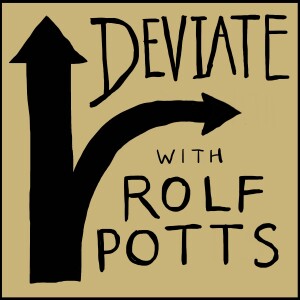
Travelers create their own distinct global culture (with anthropologist Pegi Vail)
 2022-12-20
2022-12-20
“Travel expands time, because you’re not experiencing the everyday of what you normally do. It’s all about discovery, and experiencing that with other people.” —Pegi Vail
In this episode of Deviate, Rolf and Pegi talk about how she originally sought to depict a “visual ethnography” of world travelers, their global impacts, and their power as a “gentrifying” force (2:00); how the world of travel has (and hasn’t) changed since Pegi made her film ten years ago, and how immigrants and migrant workers also represent travel communities just like backpackers and expats (11:00); the ways the notion of “journey” can serve as a metaphor for non-travel experiences, and how travel can expand one’s sense of time (26:30); what stories travelers choose to tell about places, and how drug-scenes have fueled travel communitas over the years (31:00); the role digital photography now plays in travel, and the individualized notion of what an “explorer” is (39:30); and the importance of allowing yourself to get lost on that road, the “structured danger” of most adventure travel, and relying on your “personness” (rather than technology) as a traveler (49:00).
Pegi Vail is an anthropologist and filmmaker who directed the documentary Gringo Trails. She is also a sustainable-travel consultant whose academic work has focused on visual anthropology, Indigenous media, and the role of storytelling to the political economy of tourism in the developing world. She is the Co-Director of New York University’s Center for Media, Culture, and History. Vail is a founding member, curator, and featured storyteller of the popular not-for-profit storytelling collective, The Moth.
Notable Links:
- The Vagabond’s Way, by Rolf Potts (travel book)
- Williamsburg (gentrified neighborhood in Brooklyn)
- Banana Pancake Trail (travel circuit in SE Asia)
- Lower East Side Tenement Museum (historic site in NYC)
- History of hosteling (inexpensive lodging system)
- Hippie Trail (overland travel circuit in 1960s and 1970s)
- The Great Gatsby, by F. Scott Fitzgerald (novel)
- Hmong people (ethic group in SE Asia)
- Nelson H. H. Graburn (anthropology scholar)
- Communitas (communities created by shared endeavor)
- Arnold van Gennep (ethnographer who coined “rites of passage”)
- Chaebol (South Korean industrial conglomerate)
- Rolf and Ari Shaffir talk psychedelics (Deviate episode)
- Backpack Ambassadors, by Richard Ivan Jobs (book)
- Margaret Mead Film Festival (documentary film festival)
- Spike Lee (American filmmaker)
- Melvin Estrella (Pegi’s partner and film producer)
- J. Edgar Hoover (American law-enforcement administrator)
- Eurail Pass (European train pass popular with backpackers)
- On Photography, by Susan Sontag (book)
- The Explorers Club (professional club in New York)
- Saul Bellow (American novelist)
- A Field Guide to Getting Lost, by Rebecca Solnit (book)
- Beryl Markham (British-African aviator and author)
- Digital detoxing (intentional refrain from using digital devices)
- Hippocampus (part of the brain)
The Deviate theme music comes from the title track of Cedar Van Tassel’s 2017 album Lumber.
Note: We don’t host a “comments” section, but we’re happy to hear your questions and insights via email, at deviate@rolfpotts.com.
More Episodes
 2018-11-13
2018-11-13
Create your
podcast in
minutes
- Full-featured podcast site
- Unlimited storage and bandwidth
- Comprehensive podcast stats
- Distribute to Apple Podcasts, Spotify, and more
- Make money with your podcast
It is Free
- Privacy Policy
- Cookie Policy
- Terms of Use
- Consent Preferences
- Copyright © 2015-2024 Podbean.com





